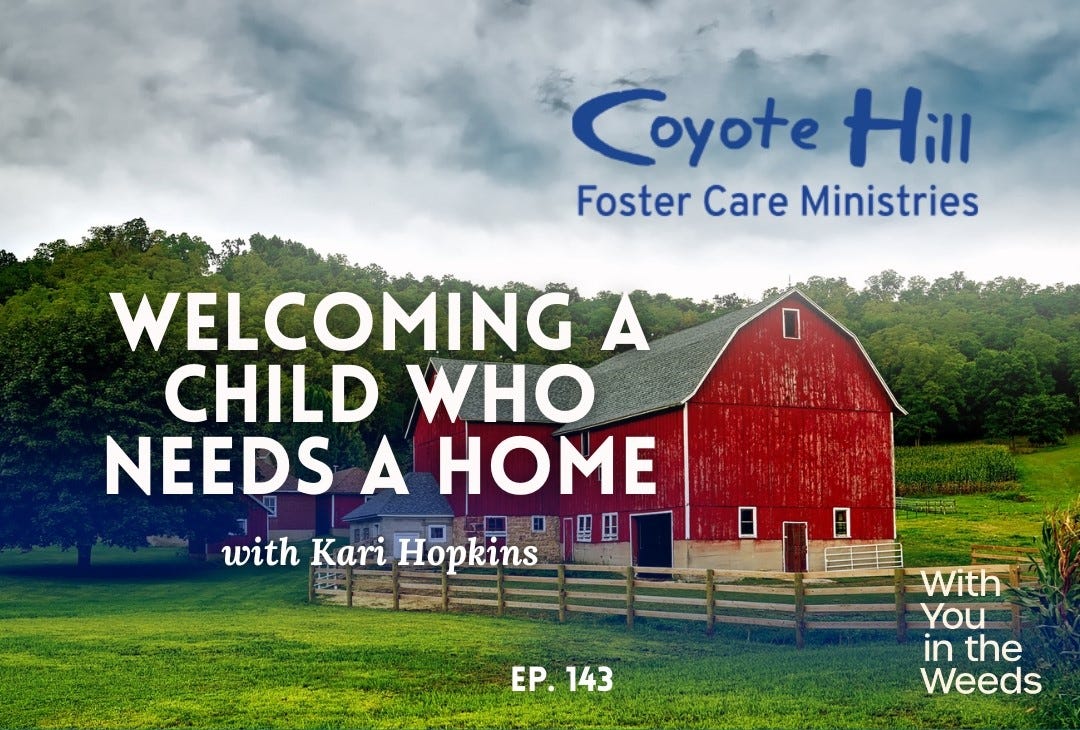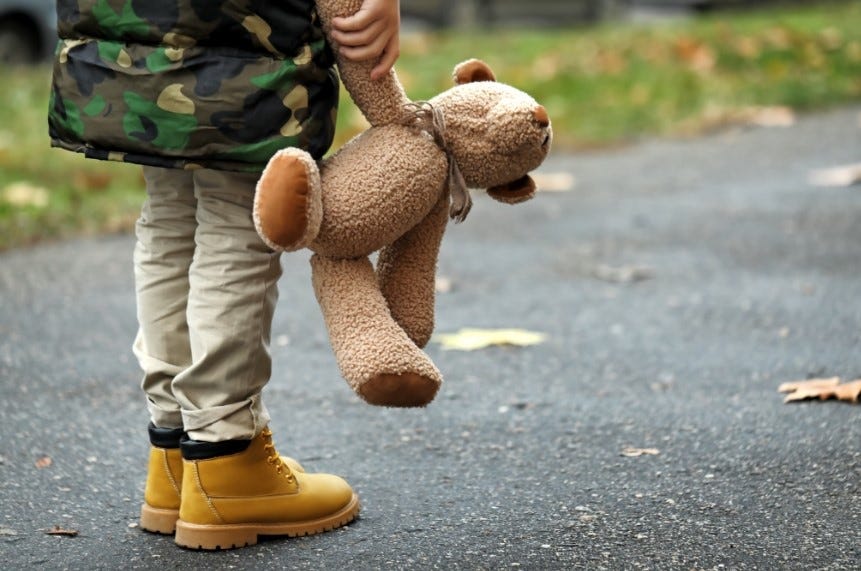Welcoming a Child Who Needs a Home
Every child’s life is a worthy investment
Have you ever thought about what you need to feel safe and secure? You might list things like people who love and care about you, a familiar home, your favorite belongings, and a sense of consistency and predictability to your everyday activities.
For children in the foster care system, safety and security are hard to find. Kids enter foster care with trauma—whatever circumstances led to foster placement, they weren’t good—and many find themselves moved from one place to another, lacking consistency and predictability when it comes to school, parenting, discipline, and schedules. Even more, they may find themselves without anyone to depend on.
In this episode of our ongoing series, Loving Your Neighbor as Yourself, John sits down with special guest Kari Hopkins, Chief Operating Officer of Coyote Hill Foster Care Ministries in Columbia, Missouri, to discuss what it means to “love your neighbor as yourself” through the ministry of fostering. Kari shares how Coyote Hill, a faith-based ministry, restores childhoods for kids in foster care by providing stable, loving homes.
Coyote Hill aims to bring back simple childhood joys like bike rides and playtime and provides equine therapy to increase self-confidence and empathy. With specialized training, foster parents are encouraged to see the child’s needs behind their behaviors, while they provide security through consistent care towards the goal of reunification or adoption.
As you listen, you’ll be challenged to ask yourself whether or not God is calling you to be a foster family to a child in need of safety and security – and love.
Highlights of John’s Conversation with Kari
John: I am with the amazing Kari Hopkins so she can share all that she knows about fostering, which is a lot. Kari, welcome. Can you share a little bit about who you are and what you do at your organization, Coyote Hill, located in Columbia, Missouri? Even though your organization is local, we know there will be broad applications for everyone listening.
Kari: Thanks, John. I am currently the Chief Operating Officer for Coyote Hill Foster Care Ministries, a ministry that I have worked at for the last 16 years. I started right out of school. The story goes that they were either going to hire someone with experience or someone young with a lot of energy and I fit the second description. I came to this with a heart for hurting children and a heart to see them be kids again.
Our ministry is to restore kids’ childhoods when life hasn’t gone the way they would have hoped. We may be giving them a bike for the first time. We’re playing with them on a playground, trying to give them a sense of childhood again.
John: Wow, so we take play for granted as adults, especially if we weren’t deprived of key resources that we needed to grow and develop. It’s striking to hear that many kids don’t know how to play.
Kari: Across our state and across our country, many children are living in chaos. And when you live in chaos or you don’t know where your next meal is going to come from, your little brains and bodies don't really get to relax. Play gives a child a chance to relax, but it's also the language of childhood.
A lot of times, foster kids have been stifled in their words and in their play because of the situation they were born into. Their only focus is trying to survive. We try to give that back to them.
John: How does Coyote Hill differ from the various state organizations that exist?
Kari: One of the biggest ways is that because we are a faith-based organization, we have ministry mindset. What that means is that every staff member and every board member sees people the way God sees them. Every child, every biological parent, and every foster parent is made in the image of God.
When you view people as having inherent worth, you treat them differently. Our ministry treats people differently. Case workers tell us that, judges tell us that, and foster parents tell us that. We get to love people in the way that God does, which includes ways that our state agencies don’t get to do.
When Coyote Hill started 34 years ago, we were a Christian children's home. That was the landscape of child welfare at the time. In 2018, there was sweeping federal legislation called the Family First Act. The intent was to keep kids and families together. So it had good intentions, but the government looked at little places like us who didn't really fit in these perfect boxes and said, "You have to change your license."
So we changed from a Christian children's home into a foster care neighborhood. That opened up the door for us to go out into the community and recruit, train, license, and advocate for foster families all over the state. We've grown significantly more in the last five years than we did in the first 30.
When we launched our foster care services team out into the community, we wanted to tackle three problems: the recruitment of foster families (there are never enough); retaining foster families (50% quit within the first year); and stabilizing kids.
Kids in foster care move, on average, every three months. That’s 2-3 different schools a year. And every time they move, they lose a lot of things: friends, connections to family and community, and often even their belongings. They have to learn a new route home from school, how to navigate a new neighborhood, and a new home address. It’s extremely traumatic.
John: I’m just having to sit with this for a minute. I’m trying to put myself in the place of a little kiddo going through this.
Kari: Yes, we had a teenager in our program, and he described it as, “Every night I didn’t know what the ceiling would look like.”
John: This makes me think of the way Jesus used the term ‘orphan’. He told the disciples when he was getting ready to leave, “I will not leave you as orphans. I will come to you." So he's recognizing, "Without me you're alone and I won't leave you there. I'll come to you through the Holy Spirit."
What do you do to equip the parent who says, okay, I'll take in a foster kid. How do you prepare them to deal with that?
Kari: Well, there's a lot of training. Let's start with the fact that they are not alone. Fostering can feel like an isolating journey in your life. Our goal as a foster care ministry is to walk alongside them on that journey. We’re there through all the ups and downs, through every crisis call at 2 a.m. because a kid isn't able to calm down and go to sleep.
We’re there for the joy of celebrating a birthday with that child, the first time they hug you, the first time they smile. For years we’ve said that we measure success by the number of smiles we see. That seems simple, but it's also not simple. It is profound because fostering is such a relational experience, such a relational ministry.
There are so many kids over the last 16 years who I can remember coming in, sullen and truly depressed. We ask ourselves, "How can they be a child? How can they already have so many heavy emotions?” Then over the course of a month or so, we watch them change and become a child again. When you give them what they need, they open up.
John: Not to criticize people who are working in the state-run foster care system – they have a difficult job – but they can’t give kids the kind of personalized care that you can. I love that you bring in the Christian dimension of God’s love, because that makes all the difference.
Kari: It’s consistency in routines, consistency in consequences, consistency in food timing so that that child can count on being fed. They come home from school knowing there will be a snack, and someone will be waiting for them. When you believe that children are worthy of love and care, you offer it to them in all the ways you know how. Not just kind words and affection.
When you believe that children are worthy of love and care, you offer it to them in all the ways you know how. Not just kind words and affection.
Our foster parents recognize that kids communicate their needs through behavior. If a child cries because you give them the green cup instead of the blue cup, can you see beneath the behavior to the message they are communicating? They’re not just thinking, “Don’t they know that I like the blue cup?” but “Do I matter? Do you see me?” When children have consistency, they start to feel secure. That leads to hope.
John: You have to be a student and a learner of this kiddo.
Kari: Absolutely. You need to be open to being vulnerable with the child first and not wait for them to be vulnerable with you because your relationship needs to grow as quickly as it can.
John: What would you tell someone who is interested in fostering, but not sure about getting started?
Kari: We would encourage you to get respite licensed. Essentially, you’d be a qualified babysitter for kids in the foster care system. You can take the kids for a weekend so that the foster parents can have a break, celebrate an anniversary. You only say yes when you’re available. That’s a wonderful way to start. After getting some experience in respite care, you could consider fostering.
John: The goal of fostering is to reunite the child with their biological family. But some of those biological homes are not healthy at all; the child cannot return. So what do you do in that case?
Kari: The vast majority of kids in foster care will reunify; often they're in care for neglect, not abuse, and if the family can be provided with the resources they need, the child can return. But when it is an unsafe situation, or doesn’t work out for another reason, about a quarter of all kids in foster care will need adoption.
When a foster family says yes to adoption, that's really them saying yes to a whole new calling because adoption is lifelong. It’s a beautiful calling, and we are thrilled to continue to support those families. As long as their journey continues with those children, we are there for the birthdays, graduations, even young adulthood. Because adoption doesn’t mean that issues and trauma go away – in fact, it can be even more challenging because the separation from their biological family is permanent.
John: A central theme in the New Testament is that we are adopted sons and daughters of God. Adoption in the Roman world was a really radical concept where you absorb the debts, legal problems, any deficiencies, any problems from the child that you would adopt. Adoption is a beautiful picture of the gospel.
Kari: We understand that we have been given grace upon grace and are therefore able to step back and give grace to children in need.
John: Kari, thank you so much for being with us today and sharing your heart for foster kids. It’s been really helpful.
Kari: Thank you, John!
Recommended Resources
Visit Coyote Hill Foster Care Ministries to learn how small acts of love can transform a child’s life.
Not ready to foster? Consider becoming respite licensed to give foster parents a break, or supporting families with meals and donations.




